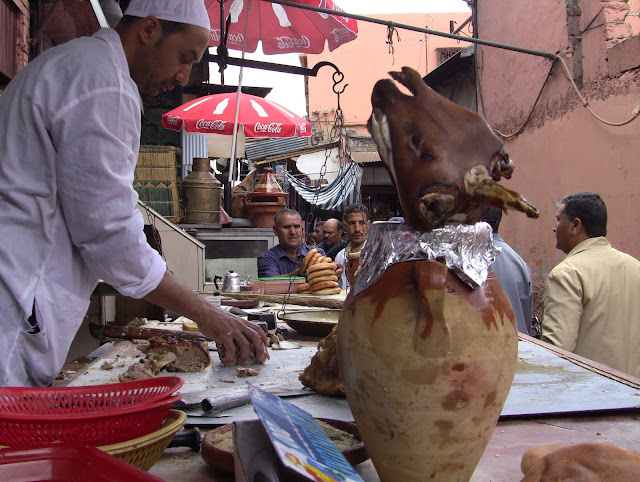While Jews all over the world celebrate Passover with varying degrees of religiousness, only the Moroccan Jews celebrate the end of Passover. They welcome bread back into their lives the day after their abstinence ends by covering their tables with the previous week's forbidden treats of sweets and pastries and Moroccan pancakes. They then throw open their doors and invite the rest of the neighborhood Jews to partake in their sugary extravaganza. Mike and I stopped by Gad's family's house for a few prayers, some kosher wine, and an abundance of saccharine goodness.
 |
| I believe this was an orange blossom almond cake. Sure wish I could've tried it. |
George and I still write each other on a somewhat regular basis. In one of his recent e-mails, he mentioned in jest that he had "arranged a race for me." While I've never been remotely interested in Nascar, Gad told us that the race atmosphere was really great and that we should try it out. After struggling through bumper to bumper (or tail to tail) traffic, getting stopped by a cop for no reason whatsoever, and wandering to and fro in search of the elusive ticket vendor for half an hour, we gave up the idea and enjoyed a cup of coffee from afar.
Sorry, George. Wish I could've taken better pictures for you.
Between all my yoga, cooking, adventuring with Mike, attending Jewish festivals, meeting up with couchsurfers, and writing short plays, I've been devouring a book by Paul Bowles called, “Up Above the World.” Paul’s first creative pursuit was poetry, but Gertrude Stein ended up telling him that he was absolute crap, so he tucked his tail behind his legs and moved on to composing. But composing confined the chronically itchy-footed artist to New York City, so he abandoned composing and took up writing. After his wife won some brilliant prize for a book she wrote, that is. Either poor Paul couldn’t stand to be outdone by his partner, Jane Bowles, or she inspired him to take up the pen himself. Paul and Jane had an excellent marriage, regardless of the fact that both identified themselves as homosexual. Their marriage was one of convenience and of fast friendship, but definitely not romance. Bowles’ writing seems a bit reminiscent of Joseph Conrad, with the claustrophobic webs of panic and anxiety he weaves. As a reader, I feel terrorized and trapped and am not at all sure why. This confusion makes the terror even more acute. Brilliant writer. Paul Bowles is very famous in Morocco because he spent a great deal of time writing in Tangier, and gained an abundance of inspiration from the city and lifestyle of Moroccans. His book, “The Sheltering Sky,” is based in Morocco, and I will order it off of Amazon.com as soon as I get back to the states. Word.
My last few days have been perfect. I’m living a fairytale life in Marrakech right now, swear to god. Of course, my idea of fairytale life might be a bit different from the average fellow’s. Chowing down on some heavenly Mechoui in a dirty souk stall, for example. Dipping greasy chunks of fall-apart lamb into bowls of cumin and salt, hands dripping with the fat and juices. Mechoui is lamb that’s been smeared with butter and slow cooked for hours in a pit in the ground for nine hours or so. The stall owners place the sheep heads on display (to be both gazed upon and eaten) atop pots of Tangia, and hoist the dripping carcasses out of the pits with long wooden sticks, serving the thronging hungry tourists and Moroccans alike. I make a general habit of staying away from throngs, but this stuff is worth thronging for. It is even better than Maria’s pork belly crackle, and that’s saying an awful lot.
 |
| The green stamps mean that this is superior quality meat. I think this customer appears rather skeptical, though. |
 |
| The hole in which the Mechoui cooks. Anything that foreboding has got to be amazing. I felt like Indiana Jones just looking into this oven. |
Dafina is another bit of heaven one can chance upon whilst in Morocco. I mentioned this meal in an earlier post when I described the Saturday lunch typical Jewish families enjoy. Here’s a link to a Dafina recipe – if you have 24 hours to wait for lunch, go for it: DAFINA
Tangia is something I will try very soon, and I will make sure to carefully document its deliciousness. A close relative of the tagine, the tangia is much oilier, cooks in an urn-like container, and requires more time to prepare. Six hours of cooking in the ashes of your local hammam, give or take. This dish is another Jewish invention, and like the Dafina, it is the product of the "Remember the Sabbath and keep it holy" commandment. I'm now convinced that the only reason God asked the Jews to refrain from lighting fires on the Sabbath was so that they would be forced to get very creative with their cooking. Leaving a meal in the ashes of a hammam for hours and hours? Thanks be to God for the amazing incentive he gave the Jewish people. All in all, I hear that Tangia a very simple stew made superb by the length of time it sits in the hammam and the prodigious amount of spices used – parsley, ras el hanout, saffron, salt, cumin, tumeric, ginger, pepper, preserved lemon, garlic – does it get any better?
I think not.







No comments:
Post a Comment